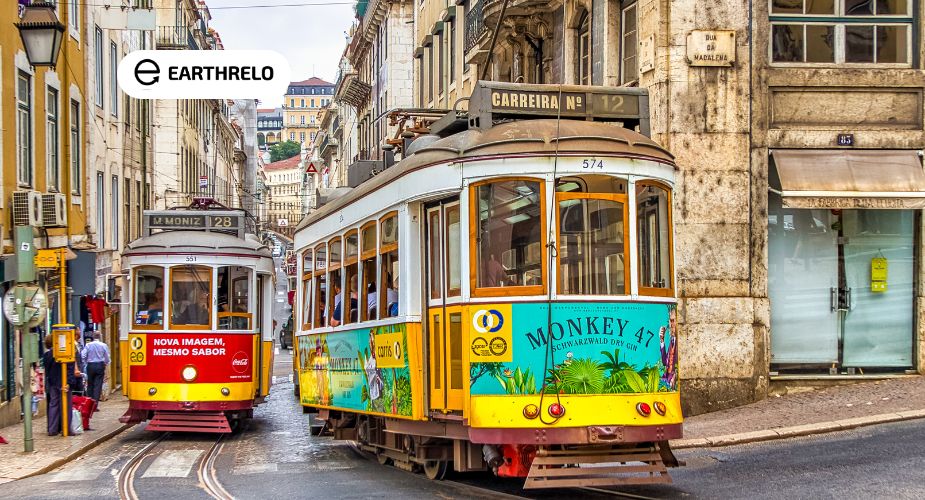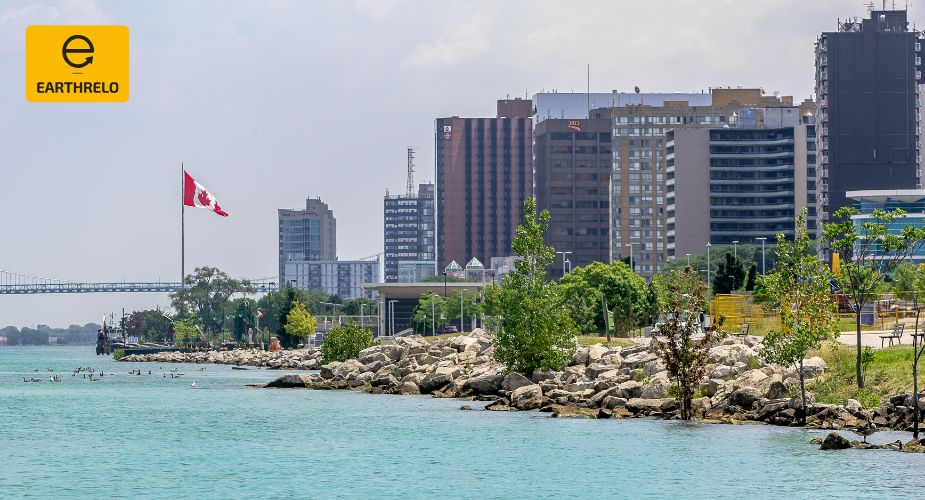- November 21, 2024
Portugal has become an attractive destination for Americans seeking a more affordable lifestyle in a scenic European setting. Known for its mild climate, rich cultural heritage, and welcoming locals, Portugal offers a quality of life that is hard to beat. Many American expats are drawn by the lower cost of living in Portugal, which often allows for a comfortable life on a modest budget. This article will break down essential aspects of the cost of living in Portugal, focusing on housing, food, transportation, and more, so you can determine if this sunny European country fits your lifestyle and financial plans.
Cost of Living in Portugal – Housing
Housing expenses make up a significant part of the cost of living in Portugal. Compared to the United States, Portugal offers affordable rental and purchase options, though prices vary widely depending on the location. Whether you’re considering a short-term stay or a more permanent move, understanding local housing costs is essential for budgeting and settling into your new home.
Renting vs. Buying: Which is Right for You?
Renting is often the preferred choice for newcomers, especially those wanting to explore different parts of Portugal before committing to a specific area. Rentals in Portugal can vary based on the city and region. Larger cities like Lisbon and Porto tend to have higher rental costs, while smaller towns and rural areas offer more affordable options.
- Lisbon and Porto: In these popular cities, the average monthly rent for a one-bedroom apartment in the city center is around €1,200-€1,500. Moving outside the city center can reduce rental costs to around €800-€1,000.
- Algarve and Coastal Towns: Known for their scenic beauty and expat communities, coastal towns like Faro or Lagos offer rental prices ranging from €800 to €1,200 per month for a similar one-bedroom apartment.
- Rural and Inland Areas: For those looking for a quieter lifestyle and a lower cost of living in Portugal, renting in rural areas can be as low as €500 to €700 for a one-bedroom apartment.
Buying property is another option if you’re planning a long-term stay or want to invest in real estate. Portugal has a diverse property market with options for all budgets, from modern apartments in the city to countryside homes.
- Lisbon: In the capital, purchasing a small apartment in the city center can cost around €3,500 per square meter, depending on location and amenities.
- Porto: In Portugal’s second-largest city, property prices are slightly more affordable than in Lisbon, averaging €2,500 per square meter in central areas.
- Countryside and Smaller Cities: Inland areas offer homes at significantly lower prices, sometimes as low as €1,200 per square meter, making it a popular choice for expats seeking an affordable cost of living in Portugal.
Popular Expat Areas in Portugal
Portugal has several regions that are especially popular among expats due to their affordability, amenities, and beautiful surroundings:
- Lisbon: As the capital and a cultural hub, Lisbon is a favorite for expats. However, it also has the highest housing costs in the country, so budgeting carefully is essential.
- Porto: Known for its wine and charming riverside views, Porto combines cultural experiences with relatively affordable housing.
- The Algarve: This sunny, coastal region attracts many retirees and families. While some areas can be pricey, there are towns within the Algarve that offer affordable housing and a resort-like feel.
- Silver Coast: Less touristy than the Algarve, the Silver Coast offers expats a blend of beautiful beaches, rolling hills, and affordable homes.
Tips on Navigating the Housing Market
- Rent Before You Buy: Many expats recommend renting first to ensure the area suits your lifestyle and daily needs.
- Understand Local Contracts: Rental agreements in Portugal may differ from what Americans are accustomed to, so it’s wise to review terms closely.
- Consider Location and Transport: Proximity to public transit can affect costs, as well as the convenience of daily commutes and amenities.
Whether renting or buying, housing costs play a significant role in the overall cost of living in Portugal, so evaluating these factors can help you make a well-informed decision while you move to Portugal.
Cost of Living in Portugal – Food and Grocery
The food scene in Portugal offers expats both affordability and quality. From dining out to shopping for groceries, food-related expenses are often significantly lower than in the United States. The Mediterranean diet, rich in fresh vegetables, seafood, and local wines, is widely available and budget-friendly, making it easier for expats to enjoy a healthy lifestyle while keeping the cost of living in Portugal manageable.
Dining Out in Portugal
Portugal has a thriving dining culture, with a wide range of options for those who enjoy eating out. Meals are generally affordable, especially outside major tourist areas, and dining can be an integral part of the social experience.
- Local Restaurants: A meal at a typical Portuguese restaurant costs around €10-€15 per person, which includes a main dish, side, and drink. Even in Lisbon and Porto, prices are reasonable, with many locals enjoying daily lunches at cafés and restaurants.
- Cafés and Bakeries: Cafés are a beloved part of Portuguese culture. A coffee and a pastel de nata (Portuguese custard tart) usually cost less than €2.
- High-End Dining: For special occasions, Portugal offers Michelin-starred restaurants and fine dining options. These meals may cost €50-€100 per person but provide a unique gastronomic experience.
Grocery Shopping: A Cost-Effective Way to Eat Well
For those who prefer cooking at home, grocery prices in Portugal are generally much lower than in the U.S. Many grocery items are produced locally, which helps keep prices low and quality high.
- Fresh Produce: Fruits, vegetables, and fish are widely available and affordable. A week’s worth of fresh produce for two people can cost around €20-€30.
- Meat and Dairy: Portuguese meats, cheeses, and dairy products are reasonably priced. A kilogram of chicken breast costs about €6, while milk is around €0.80 per liter.
- Imported Goods: Items imported from outside the EU, like certain spices or American brands, can be more expensive. However, these items are typically luxuries rather than staples.
Shopping Tips to Stretch Your Budget
- Shop at Local Markets: Many towns and cities in Portugal have weekly markets where you can find fresh, locally grown produce at lower prices than in supermarkets.
- Buy Seasonal Produce: Seasonal fruits and vegetables are generally cheaper and fresher.
- Look for Discount Grocers: Chain stores offer competitive prices on essentials, and discount supermarkets like Lidl and Aldi provide quality items at lower costs.
Food and groceries contribute significantly to the cost of living in Portugal. With the right shopping habits, it’s possible to eat well and stay within budget, allowing expats to enjoy Portuguese cuisine without overspending.
Transportation and Mobility Costs
Transportation is another essential part of the cost of living in Portugal. With a well-connected public transport network, affordable car ownership options, and even budget-friendly alternatives like cycling, getting around Portugal is both convenient and economical. Let’s break down the main transportation options and costs to help you plan accordingly.
Public Transportation: Affordable and Accessible
Portugal’s public transportation system is reliable, with extensive networks in major cities and suburban areas. Public transportation is particularly appealing for those who live in urban areas, helping reduce the overall cost of living in Portugal.
- Metro and Bus Services: Lisbon, Porto, and other larger cities have metro systems, along with bus and tram services. Monthly passes generally cost around €40-€50, covering unlimited metro, tram, and bus rides within the city limits.
- Regional Trains: For intercity travel, trains are efficient and moderately priced. A one-way ticket from Lisbon to Porto costs about €25, while local commuter trains, known as “Urbanos,” connect smaller towns at a fraction of the cost.
- Discounts for Seniors and Students: Portugal offers discounts on public transportation for seniors, students, and children, making it even more affordable for families and retirees.
Owning a Car in Portugal: Costs and Considerations
Although public transportation is excellent, some expats prefer the freedom of owning a car. Car ownership can be convenient, especially in rural areas or if you plan to explore Portugal extensively.
- Car Purchase: New car prices in Portugal can be high due to import taxes. Many expats opt for used cars, which can range from €5,000 for an older model to €20,000 for a recent one.
- Fuel Prices: Gasoline and diesel are more expensive in Portugal compared to the U.S., averaging around €1.60 per liter. This cost can add up, particularly for daily drivers.
- Insurance and Registration: Monthly car insurance costs average €50-€70, depending on the vehicle and coverage type. Annual registration fees vary by vehicle model and can range from €50 to €150.
Alternatives: Cycling and Walking
For those looking to keep their cost of living in Portugal low, cycling and walking are popular, especially in coastal and smaller towns. Portugal’s cities are bike-friendly, with paths and designated lanes, while walking is often feasible due to the mild climate and compact urban centers.
- Cycling Costs: Bike rentals are affordable, starting at about €10 per day, and purchasing a bike can cost between €200 and €500.
- Pedestrian-Friendly Cities: Lisbon, Porto, and Coimbra are highly walkable, offering an enjoyable way to explore without incurring extra travel costs.
With affordable public transport, flexible car ownership options, and easy access to cycling, the transportation component of the cost of living in Portugal is highly adaptable to your lifestyle preferences.
Healthcare in Portugal
Healthcare is a critical consideration for Americans moving abroad, and it can significantly impact the cost of living in Portugal. Portugal’s healthcare system is known for its quality and affordability, with both public and private options available to residents and expats alike. The country’s healthcare expenses are generally lower than in the United States, offering a substantial cost-saving benefit for those who relocate.
Public Healthcare: Coverage and Costs
Portugal’s public healthcare system provides affordable medical services to residents. While it’s funded through taxes, the costs for actual medical services are minimal, making it an appealing option for expats.
- Public System Access: Residents with a local social security number can access public healthcare services at low or no cost. This includes primary care, specialist consultations, and hospital visits.
- Out-of-Pocket Costs: While basic services are often free, small fees may apply for certain procedures, typically around €5-€15 per visit. Prescription medications can also be obtained at discounted rates.
- Wait Times: Though affordable, public healthcare may involve longer wait times for non-emergency services, as it prioritizes residents based on need rather than first-come, first-served.
Private Healthcare: A Flexible Alternative
Many expats opt for private healthcare to supplement or replace public services, especially if they prefer shorter wait times or English-speaking providers. Portugal’s private healthcare system is widely available, offering high-quality medical care at a fraction of U.S. costs.
- Private Health Insurance: Private insurance is popular among expats and starts at around €50 per month. Comprehensive plans, which cover a wide range of treatments and reduce out-of-pocket costs, can cost around €100-€150 monthly.
- Private Hospital and Clinic Costs: Fees for a doctor’s visit range from €50 to €100, depending on the specialty. Emergency care, surgeries, and advanced treatments in private hospitals are also affordable compared to U.S. rates.
- English-Speaking Providers: Many private facilities have English-speaking staff, which can be comforting for expats new to Portugal’s healthcare system.
Comparing U.S. and Portuguese Healthcare Expenses
For Americans, healthcare savings represent one of the biggest advantages of the cost of living in Portugal. The lower costs allow many expats to access quality medical care without financial strain, creating opportunities to save significantly over time.
- Routine Appointments: In the U.S., a standard doctor’s visit can range from $100 to $200 without insurance, whereas in Portugal, it’s often less than half that amount.
- Hospitalization Costs: A hospital stay in Portugal is affordable even in private facilities, averaging around €200-€300 per day, including meals and basic care.
- Medication and Pharmacy: Prescription drugs are available at reduced rates, making essential medications more accessible to expats.
Overall, Portugal’s healthcare system is a key factor in making the cost of living in Portugal appealing to Americans. With low out-of-pocket costs and accessible insurance options, Portugal provides quality healthcare without the high price tag often associated with U.S. medical services.
Utilities and Internet Costs
When considering the cost of living in Portugal, utilities and internet are key expenses to keep in mind. Utility costs can vary depending on location, climate, and energy consumption habits, while internet and phone services are generally reliable and affordable. Here’s an overview of typical utility and internet costs for expats in Portugal.
Monthly Utility Expenses: Electricity, Water, and Gas
Utilities in Portugal include electricity, water, gas, and waste collection. Monthly costs vary based on household size, consumption, and whether heating or air conditioning is needed.
- Electricity: The average cost for electricity is about €40-€60 per month for a one-bedroom apartment, though it may increase to €80-€100 during colder months if heating is needed.
- Water: Water bills are relatively low, typically costing around €15-€30 per month for an average apartment.
- Gas: Many homes use gas for cooking and heating water. Monthly gas costs are usually around €20-€40, depending on usage. If a central heating system is installed, costs may rise in the winter months.
- Waste Collection and Other Services: Waste collection fees are generally included in municipal taxes, which vary by region but are often around €10-€15 monthly.
Internet and Mobile Plans
Staying connected is important, and Portugal offers a range of options for internet and mobile services. Internet speeds are high, with options for fiber connections in urban areas.
- Home Internet: High-speed internet packages range from €25-€40 per month for a standard connection. Bundled deals with TV and phone services may offer better value for those needing multiple services.
- Mobile Plans: Mobile phone plans in Portugal start around €10 per month for basic packages, while unlimited data plans cost approximately €20-€30 per month. Many providers offer flexible, pay-as-you-go options, ideal for expats unsure about long-term contracts.
- Wi-Fi Availability: Portugal’s cities and towns have widespread Wi-Fi availability, especially in public places, cafés, and libraries, making it easy to stay connected without added costs.
Tips for Reducing Utility Costs
- Energy Efficiency: Using energy-efficient appliances and minimizing heating or cooling can help reduce electricity bills, especially in winter.
- Bundled Services: Consider bundled internet, TV, and phone packages for cost savings.
- Seasonal Adjustments: Portugal’s mild climate often allows residents to minimize heating and cooling expenses, which can contribute to a lower cost of living in Portugal.
Overall, utility and internet costs are manageable and often lower than in the U.S., contributing to a more affordable lifestyle in Portugal.
Entertainment and Leisure Expenses
Entertainment and leisure are integral to enjoying life abroad, and Portugal offers a variety of affordable options that fit different budgets and interests. From dining out to outdoor adventures and cultural activities, Portugal’s vibrant lifestyle contributes to a fulfilling yet budget-friendly cost of living in Portugal.
Dining Out and Social Activities
Dining out is a cultural pastime in Portugal, with locals and expats alike enjoying meals with family and friends. Portugal’s dining scene is diverse, offering everything from local eateries to high-end restaurants, and costs remain affordable even in larger cities.
- Local Eateries: A meal at a casual restaurant costs around €10-€15, including a main dish and drink. Coastal towns often have fresh seafood options, while cities like Lisbon and Porto offer international cuisine.
- Cafés and Bakeries: Portugal’s café culture is affordable, with a coffee and pastry costing about €2. Spending an afternoon at a café is a popular, budget-friendly way to enjoy Portuguese life.
- Fine Dining: For special occasions, fine dining options range from €40-€100 per person, offering a gourmet experience without the hefty price tag often found in other European countries.
Outdoor Activities and Sports
Portugal’s natural beauty and mild climate make it ideal for outdoor activities. Beaches, hiking trails, and parks are often free or low-cost, allowing expats to enjoy a range of leisure activities.
- Beaches and Coastal Activities: Portugal’s coastline offers endless beach options, perfect for swimming, sunbathing, and water sports. Many beaches are free to access, though equipment rentals for activities like surfing may cost around €20-€30 per hour.
- Hiking and Nature Walks: National parks and scenic trails are accessible and often free. The Douro Valley, Sintra, and Serra da Estrela offer unique landscapes for hiking and exploration.
- Sports Clubs and Gyms: Memberships to gyms or local sports clubs cost between €25-€50 per month, depending on the facilities. Many towns have public sports centers that offer reduced fees.
Cultural Experiences: Festivals, Museums, and Events
Portugal’s rich culture is accessible to everyone, with numerous festivals, museums, and local events held throughout the year.
- Museums and Historical Sites: Entry fees to museums and historical sites typically range from €5-€15, with discounts often available for students and seniors. Many cities, like Lisbon and Porto, also offer free museum days.
- Festivals and Public Celebrations: Traditional festivals, such as Carnaval and Saint Anthony’s Day, are free to attend and include parades, music, and food stalls. These events provide a great opportunity to immerse yourself in Portuguese culture.
- Music and Performing Arts: Portugal has a vibrant arts scene, with music concerts, theater performances, and dance shows held frequently. Tickets to local shows and smaller venues cost around €10-€20, making cultural outings budget-friendly.
Budgeting for Leisure and Entertainment
- Take Advantage of Free Events: Many events, particularly festivals and public performances, are free and provide a great way to experience local culture.
- Explore Local Dining Deals: Some restaurants offer daily lunch specials, or prato do dia, at reduced prices, often including a main dish, drink, and dessert.
- Stay Active Outdoors: With abundant natural spaces, staying active in Portugal doesn’t have to come with a high price tag, keeping the cost of living in Portugal affordable.
Entertainment and leisure expenses in Portugal are typically lower than in the U.S., allowing expats to enjoy a balanced and engaging lifestyle without stretching their budget. With diverse options and accessible prices, Portugal’s leisure activities contribute to a high quality of life at a lower cost.
Taxes and Financial Considerations
Understanding the tax implications of living in Portugal is essential for any American considering relocation. Taxes impact the overall cost of living in Portugal, so it’s vital to be aware of income tax obligations, U.S. tax requirements, and any potential tax benefits available to expats.
Tax Obligations in Portugal
Portugal has a tiered tax system for income, property, and capital gains. Expats residing in Portugal for more than 183 days per year are considered tax residents and must report their global income. Tax rates are progressive, depending on the income bracket.
- Income Tax: Income is taxed at progressive rates from 14.5% to 48%. However, certain expats may qualify for Portugal’s Non-Habitual Resident (NHR) program, which offers tax incentives for up to 10 years.
- Capital Gains Tax: Capital gains are taxed at 28% for non-residents, while residents are taxed at a rate based on half of the gains. This rate is applied to property sales, investments, and certain financial assets.
- Property Tax (IMI): Property owners in Portugal pay an annual Municipal Property Tax (IMI) based on the property’s assessed value. Rates range from 0.3% to 0.8% and vary by municipality.
U.S. Tax Requirements
Americans living in Portugal are still required to file a U.S. tax return each year. However, tax treaties and exclusions can help prevent double taxation and reduce the financial burden for U.S. citizens abroad.
- Foreign Earned Income Exclusion (FEIE): Qualifying U.S. citizens can exclude up to a certain amount of foreign-earned income, reducing their U.S. tax liability. This exclusion can help offset the cost of living in Portugal for American expats.
- Foreign Tax Credit (FTC): The FTC allows U.S. taxpayers to claim a credit for foreign taxes paid, reducing U.S. taxes on income that’s already taxed in Portugal.
- Tax Treaty Benefits: The U.S.-Portugal tax treaty helps clarify which country taxes specific types of income and can prevent double taxation on items like Social Security and pensions.
Social Security and Retirement Income
American retirees often wonder how their Social Security benefits and retirement income will be taxed in Portugal. Due to Portugal’s tax treaty with the United States, expats can avoid double taxation on these earnings.
- U.S. Social Security: Under the tax treaty, Social Security benefits received from the U.S. are typically only taxed in the country where they are sourced, which means Portugal does not tax these benefits.
- Retirement Accounts: Distributions from U.S.-based retirement accounts may be subject to Portuguese taxes, depending on residency status and tax agreements. Expats should consult with a tax advisor to understand their specific obligations.
Considering these tax factors is essential in calculating the cost of living in Portugal and ensuring compliance with both U.S. and Portuguese tax laws.
Wrapping Up
Portugal has gained recognition as an attractive destination for Americans looking for an affordable yet enriching lifestyle abroad. The cost of living in Portugal is generally lower than in the United States, allowing expats to enjoy a comfortable life with quality healthcare, vibrant cultural experiences, and a diverse housing market.
From housing and groceries to entertainment and healthcare, Portugal offers a balanced lifestyle where essential expenses are budget-friendly. Utility costs, transportation, and leisure activities also contribute to the affordability, while taxes and healthcare considerations add to Portugal’s appeal. However, Americans should be mindful of both U.S. and Portuguese tax requirements to avoid surprises.
As you consider the benefits of moving to Portugal, understanding the cost of living in Portugal will help you make informed choices. With the right planning, you can enjoy a fulfilling lifestyle in this beautiful European country.





